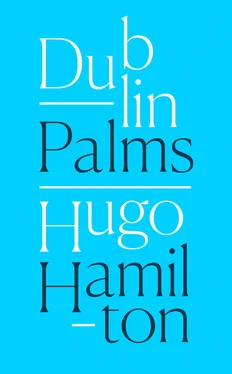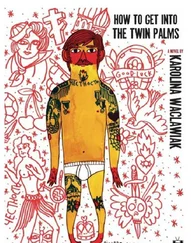If only it was possible to understand his vision, the mixed family enterprise he created. If only it had not been so obscured by his rage, his love, the silence he cast over the family with his crusade. I thought of him reading to improve his German. The care my mother took to correct his grammar. The risk they entered into. The adventure in their eyes when they started this strange family out of place. The house was full of love and misunderstanding. She encouraged him to do things he would never have taken on in his own language, this beekeeping enterprise he got himself into.
I think of the bees arriving for the first time. Like visitors, given refuge in our home. A swarm delivered in May from West Cork. A dome-shaped straw skep with bees talking inside, buzzing with ideas. My mother welcomes them with an embroidered tablecloth, a blue bowl of star and moon shaped biscuits, her voice high with excitement. Her language is a running diary, observing my father, the strangeness of a man in his own country. He wears a protective cage over his head, stepping like an astronaut onto the flat roof while we watch from the window above. Seven faces leaning out to see him punching the humming skep with his fist. It rolls away like an empty hat. He stands back with his big gloves held up in the air. A white sheet spread out, a colony of bees dropped out before nightfall, walking up the beach to a new hive waiting.
We drove out across the mountains until we saw no more black flags. We came through a bog with yellow signs showing a black car veering over the edge. Another sign with a black hump, warning about the uneven surface. The car we had was beige, maybe mustard brown. It had a boxy shape, a biscuit tin with no seat belts in the back, the gear lever was up high by the steering wheel. A slide window, so you could leave your elbow out. The girls were screeching in the back, lifted off their seats with every bump in the road. Helen had her bare feet on the dashboard, I was distracted by her knees.
Hard to say if I was driving away from something or driving towards something. My decisions were random, based on forces in my childhood I could not explain. Behaving at the mercy of feelings that never matched the time we were in. I was creating my own mixed family enterprise, doing my best to be unlike the family I came from.
It was late in the afternoon, we got fish and chips. I had a bottle of wine, some shallow styrofoam containers from a Chinese restaurant for wine glasses.
I drove the car into a field. The weeds squeaked along the paintwork, slapping under the wheel arches. The silence when I turned off the engine was enormous, nothing but ourselves and the sound of wrapping paper and the smell of salt and vinegar. The country was depopulated. Only us, sitting with the doors open, facing the sunset. It was warm. The breeze was like a hairdryer coming through, it blew a paper napkin up against the windscreen.
We waited for the sun to leave, the children went to sleep. In the middle of Ireland, we sat watching the field going dark. The wind came up. A few drops of rain at first, then louder, bouncing on the roof of the car. Helen said it was as heavy as the rain in Canada. She told me how she was once caught in a thunderstorm and could not find her way home. The streets all looked the same, the rain bounced a foot off the ground, it created a halo around the world, her hair down on her skull, blinded by the weight of water in her eyes.
She sat in the car staring into the field of rain as though she was back in Canada, with Lake Huron in front of her. A solid black plate lit up in a flash of lightning, the salt mine, the two bright lines of the railway tracks, her family home in view for a brief unreachable instant.
Give my love to the lake, she said. Give my love to the night-heron. Give my love to the boardwalk and the big empty salt rooms underneath the lake.
I started up the engine, we had to go before the mud kept us there for the night. I was the expert at getting home, driving like a lover, like a father, picking the children up in my arms from the back seat when we got home, one after the other in sleep level six, carrying them inside. Helen opened the doors, taking their shoes off, shielding their eyes from the light. I placed them without interruption into their beds like time travellers, straight from the field of fish and chips to the next morning with the light coming through the curtains. Nothing but the crown of a thistle caught in the bumper for proof.
There was a trick I taught them on that trip. They climbed up on the stump of a tree and jumped into my arms. The leap of trust, we called it. I was the catcher, standing ready. They had to take it in turns and wait for me to shout – jump. Essie was fearless, she threw herself backwards off the bonnet of the car.
It gave us a false sense of security. As though nothing could ever happen to us. Our lives were accidental, full of love and luck and family chaos, rescued by our children.
We collected them from their art class. We did some shopping on the way home. I parked the car across the road from the house. Helen went around to get the groceries, a bag in her arms with the stalk of a pineapple growing out of her shoulder. I went to get the children out and saw Rosie standing in the middle of the road.
I didn’t have time to ask how she got there.
The sound of tyres was so loud it silenced the entire street, there was blue smoke rising, it smelled like Halloween fires burning. Rosie closed her eyes, her body shivered, her hands held up to stop the car. It came to a stop inches away from her. The driver sat motionless with his grip on the steering wheel, unable to get out, staring ahead at the child in the street. Helen looked at me, the bag with the pineapple fell out of her arms. It was that soundless space in between us that frightened me more than anything, the dry mouth words we could not say to each other, the leap of trust, where was the catcher? She ran without looking and picked Rosie up off the street. She continued running until she got inside the house. I grabbed Essie by the hand. The traffic was held up, the whole street waiting until we had the door closed behind us.
Helen stood screaming in the front room.
I took the children into the kitchen and started making pancakes.
Her scream continued for a long time. It went back to the time when she was a child only five years of age herself. In Birmingham. The house on the corner with the buses going by and passengers looking in the windows. Her father at work, her mother in the kitchen with earrings on peeling potatoes. Helen standing on the street, the side gate had been left open, her younger sister was getting into the back of a car. The driver was holding a bag of sweets. Her other sister, no more than three, was climbing in to join her. It was a Wolseley with leather seats, their legs were dangling. And the housekeeper from Ennis running out when she heard the scream, making up for everything she had lost in her own life, the baby she had to leave behind in Ireland. She was shouting Holy Jesus. Mary mother. Reaching into the back of the car to clutch the two girls by the arms at the last minute before the car took off around the corner with the rear door swinging. The howling of tyres creeping like a wounded animal along the wall.
The side gate was locked again.
Her mother’s face was at the kitchen window like a photograph gone black and white. To make them forget, the housekeeper put them all three into the bath and taught them a song about James Connolly, a working-class hero. Nobody called the police, it would have been shameful to have them come around to the house, people asking if it had to do with being Irish. Nothing happened, everyone was safe. He was caught some ten years later, an engineer, the Cannock Chase man. Only some of the bodies were found. He never admitted anything apart from the fact that he loved cars, somebody bought his Wolseley at auction to be burned in a public ceremony with a crowd of people standing by to watch.
Читать дальше












